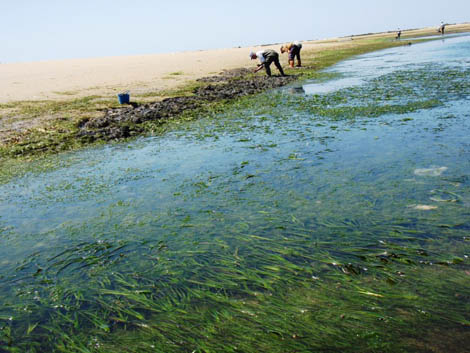 Children from Culatra will help researchers from the Center for Marine Sciences (CCMAR) in the Algarve in conserving the marine biodiversity of this barrier island in the Ria Formosa. On Monday, 29th of May, 30 students from the Basic School of this fishing village in the municipality of Faro they will go out to sea with scientists to discover the seagrass beds that exist along the island, a fundamental element of the Ria Formosa ecosystem.
Children from Culatra will help researchers from the Center for Marine Sciences (CCMAR) in the Algarve in conserving the marine biodiversity of this barrier island in the Ria Formosa. On Monday, 29th of May, 30 students from the Basic School of this fishing village in the municipality of Faro they will go out to sea with scientists to discover the seagrass beds that exist along the island, a fundamental element of the Ria Formosa ecosystem.
During the outing, the children will help “register with drawings and photographs the biodiversity of the seagrass meadows, to make an exhibition explaining to the general public why it is important to conserve them”, according to those responsible for the CCMAR Adopte programme, in the framework from which this initiative flows.
As the name indicates, this program challenges the adoption of seagrass beds, a challenge accepted by the Association of Residents of Ilha da Culatra, who took responsibility for the prairie that exists on the island and now "ensures its conservation and good condition".
“Sea grasslands are the habitat where many endangered species such as seahorses hide, feed and reproduce. Ilha da Culatra is one of the most important places in the world for seahorses due to its seagrass meadows, made up of three species of plants there”, they added.
At the same time, this place “hosts and serves as a motherhood for many species of commercial interest, such as cuttlefish and sea cucumbers, which are currently in great demand due to the high prices they reach in Asian food markets, where several species are already scarce”.
Seagrass beds are also important for cleaning waters, “removing nutrients and suspended particles”, and for combating coastal erosion “by stabilizing sediments by their roots”. In the case of the existing one in Culatra, it supplied the mother plants for the recovery of the new grasslands transplanted by the Biomares project to the Arrábida Natural Park.
“The children of the school on Ilha da Culatra will learn in this way, to teach their families the importance of not destroying seagrasses, for the good of all”, concluded the promoters of Adopte.


















Comments